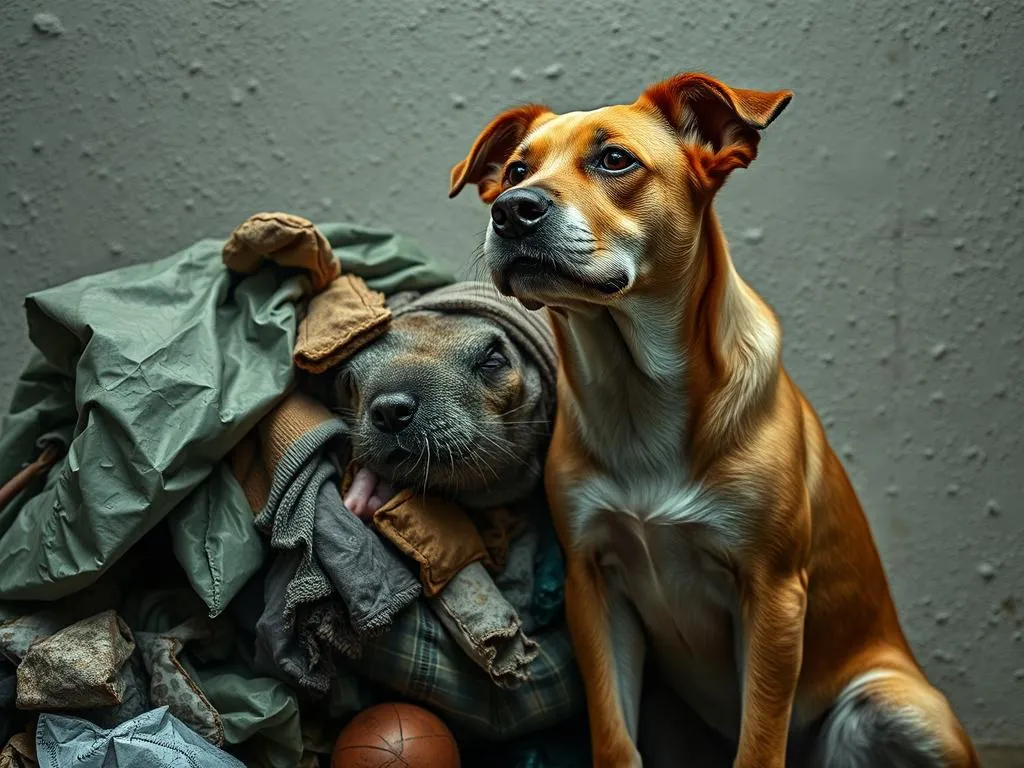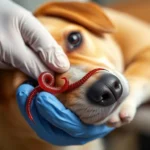
Introduction
Garbage gut is a colloquial term for a condition more formally known as gastroenteritis in dogs. This condition arises when dogs consume inappropriate items, often leading to significant digestive distress. Understanding garbage gut is crucial for dog owners, as it can pose serious health risks for their furry companions. From mild digestive upset to severe dehydration, the effects of garbage gut can vary widely, making it essential for pet owners to stay informed and vigilant.
The importance of recognizing and addressing garbage gut cannot be overstated. Dogs are natural scavengers, which means they may eat things that are harmful to their digestive systems. Knowing what to look for and how to respond can make a significant difference in your dog’s health and well-being. In this article, we will explore the definition and symptoms of garbage gut, its causes, diagnosis, treatment options, prevention strategies, and address some common FAQs to help you navigate this condition effectively.
What is Garbage Gut?
Definition and Symptoms
Garbage gut refers to an inflammation of the gastrointestinal tract, typically caused by dietary indiscretion. When dogs eat spoiled food, non-food items, or undergo sudden dietary changes, their digestive systems can react negatively, leading to gastroenteritis. Common symptoms of this condition include:
- Vomiting: Often the first sign, it can be frequent or sporadic.
- Diarrhea: This can range from soft stools to watery and may contain blood or mucus.
- Lethargy: Dogs may become less active and show signs of fatigue.
- Loss of appetite: Many dogs will refuse to eat, which can lead to further complications if not addressed.
If you notice any of these symptoms in your dog, it is crucial to monitor their condition closely.
Causes of Garbage Gut
Several factors can lead to garbage gut in dogs, including:
- Dietary indiscretion: This is the most common cause, often resulting from dogs eating spoiled food or non-food items like garbage, toys, or even feces.
- Sudden changes in diet: Introducing new foods too quickly can upset a dog’s stomach.
- Exposure to toxins: Certain plants, chemicals, and human foods (like chocolate or grapes) can cause gastrointestinal distress.
- Pre-existing medical conditions: Dogs with underlying health issues, such as pancreatitis or inflammatory bowel disease, may be more susceptible to gastroenteritis.
Understanding these causes can help pet owners take preventive measures to protect their dogs.
Diagnosis of Garbage Gut
When to Contact the Vet
Recognizing when to seek veterinary care is essential. If your dog displays severe symptoms, such as:
- Persistent vomiting or diarrhea lasting more than 24 hours
- Signs of dehydration (dry gums, lethargy, sunken eyes)
- Blood in vomit or stool
- Severe abdominal pain or bloating
it is crucial to contact your veterinarian immediately. Timely intervention can prevent complications and ensure your dog receives the appropriate care.
Diagnostic Procedures
When you visit the vet, they will likely conduct a thorough examination, which may include:
- Physical examination: The vet will check for signs of dehydration, abdominal pain, and overall health.
- Laboratory tests: Blood tests and fecal exams can help identify infections or underlying conditions.
- Imaging: X-rays or ultrasounds may be performed to rule out blockages or other gastrointestinal issues.
These diagnostic procedures are vital to determine the exact cause of your dog’s symptoms and to guide treatment.
Differential Diagnoses
Several conditions can mimic the symptoms of garbage gut, including:
- Parvovirus: A highly contagious viral infection that can be fatal, especially in puppies.
- Inflammatory bowel disease: A chronic condition that requires ongoing management.
- Pancreatitis: Inflammation of the pancreas can lead to severe digestive issues.
Your veterinarian will work to differentiate these potential diagnoses during the examination.
Treatment Options
Veterinary Care
The treatment for garbage gut often starts with veterinary care. Common interventions include:
- Fluids and electrolytes: To address dehydration, your vet may recommend intravenous fluids or oral rehydration solutions.
- Medications: Anti-nausea medications and antibiotics may be prescribed to manage symptoms and treat any underlying infections.
It is essential to follow your veterinarian’s advice regarding medications and treatment plans to ensure your dog recovers fully.
Home Care and Management
Once your veterinarian has assessed your dog, you may need to manage their care at home. Important steps include:
- Dietary restrictions: Withhold food for 12-24 hours to allow your dog’s digestive system to settle. After this period, you can gradually introduce a bland diet.
- Suggested foods: Boiled chicken or rice can be gentle on the stomach. Avoid rich or fatty foods, as they can exacerbate symptoms.
- Hydration tips: Encourage your dog to drink water or offer ice chips to prevent dehydration.
Monitoring your dog closely during recovery is critical. If symptoms persist or worsen, consult your veterinarian.
Prevention of Garbage Gut
Dietary Management
Preventing garbage gut starts with managing your dog’s diet effectively. Here are some strategies:
- Balanced diet: Feed your dog high-quality, nutritionally balanced dog food appropriate for their age and size.
- Recommended foods and feeding practices: Stick to a consistent feeding schedule and avoid giving table scraps or human food.
- Avoiding table scraps and garbage: Training your dog not to scavenge can significantly reduce the risk of garbage gut.
Creating a structured feeding routine can help keep your dog’s digestive system healthy.
Monitoring Behavior
Keeping an eye on your dog’s behavior is crucial in preventing garbage gut. Here are some tips:
- Keeping an eye on what your dog is eating: Supervise your dog during walks and playtime to prevent them from eating harmful items.
- Training and behavioral strategies: Teaching commands such as “leave it” can help prevent scavenging behavior.
Consistent training can create safer habits for your dog.
Regular Vet Check-ups
Routine veterinary check-ups are essential for maintaining your dog’s health. Regular visits allow your vet to:
- Evaluate your dog’s health: Early detection of potential issues can prevent complications.
- Vaccinations and preventive care: Staying up-to-date on vaccinations and preventive treatments helps protect your dog from various diseases.
Regular check-ups can be a vital part of keeping your furry friend healthy.
FAQs about Garbage Gut in Dogs
Common Questions Pet Owners Ask
How long does garbage gut last?
The duration of garbage gut can vary based on the severity of the condition and the treatment provided. Mild cases may resolve within 24-48 hours, while more severe cases can take several days to recover fully.
Can garbage gut be fatal?
While most cases of garbage gut are not fatal, severe dehydration or underlying conditions can make it life-threatening. It’s essential to seek veterinary care if symptoms worsen or persist.
What are the long-term effects?
Most dogs recover fully from garbage gut, especially with prompt treatment. However, recurring episodes can lead to chronic gastrointestinal issues, necessitating ongoing management.
How can I tell if my dog is recovering?
Signs of recovery may include a return of appetite, decreased vomiting or diarrhea, and increased energy levels. If you notice these improvements, your dog is likely on the mend.
Expert Insights
Veterinarians emphasize the importance of prevention and awareness regarding garbage gut. According to Dr. Jane Smith, a veterinarian with over 15 years of experience, “Pet owners must be vigilant about their dogs’ eating habits. Prevention is key to avoiding the complications associated with garbage gut.” Current research indicates that dietary indiscretion is one of the leading causes of gastroenteritis in dogs, highlighting the need for pet owners to be proactive in monitoring their dogs’ diets.
Conclusion
Understanding garbage gut in dogs is vital for all pet owners. This condition can lead to severe health risks if not identified and addressed promptly. By recognizing the symptoms, knowing when to seek veterinary care, and implementing preventive measures, you can help keep your dog safe and healthy. Regular veterinary check-ups, a balanced diet, and training can significantly reduce the risk of garbage gut and contribute to your dog’s overall well-being.
As responsible pet owners, awareness and proactive care are our best tools in ensuring the health of our beloved companions. If you have any concerns about your dog’s health, don’t hesitate to consult your veterinarian.









